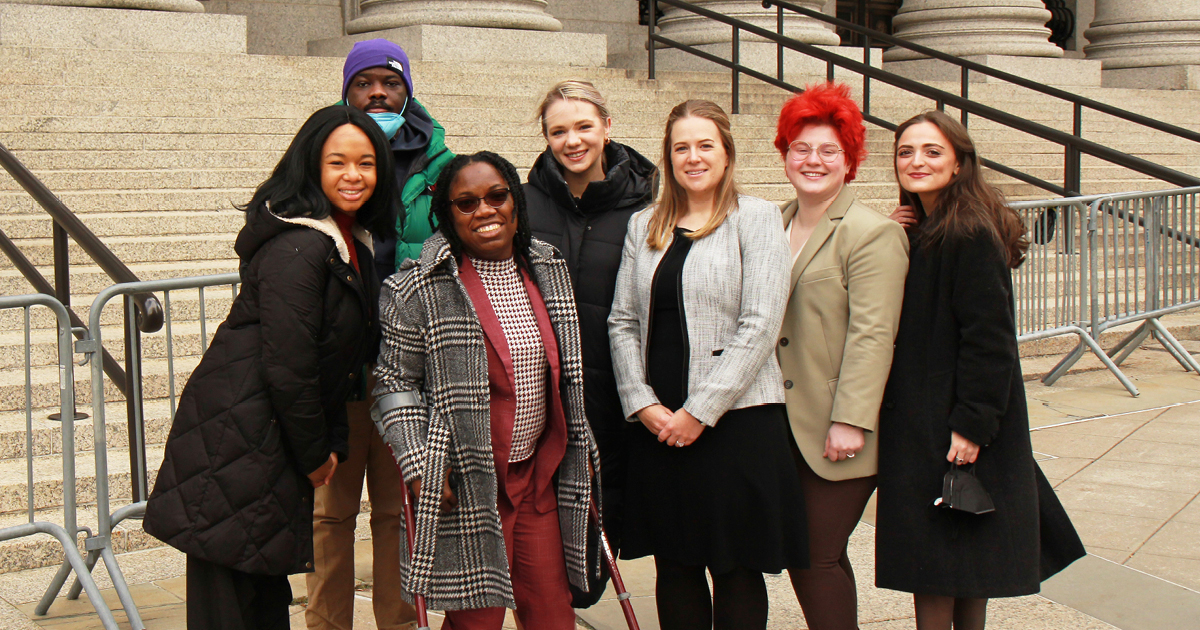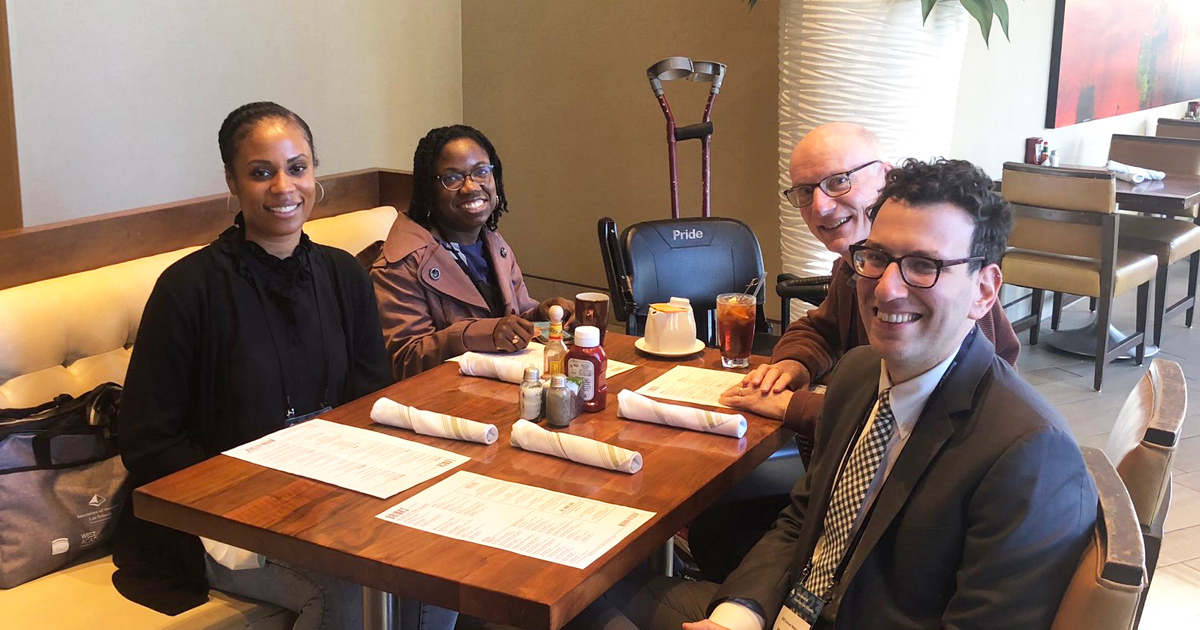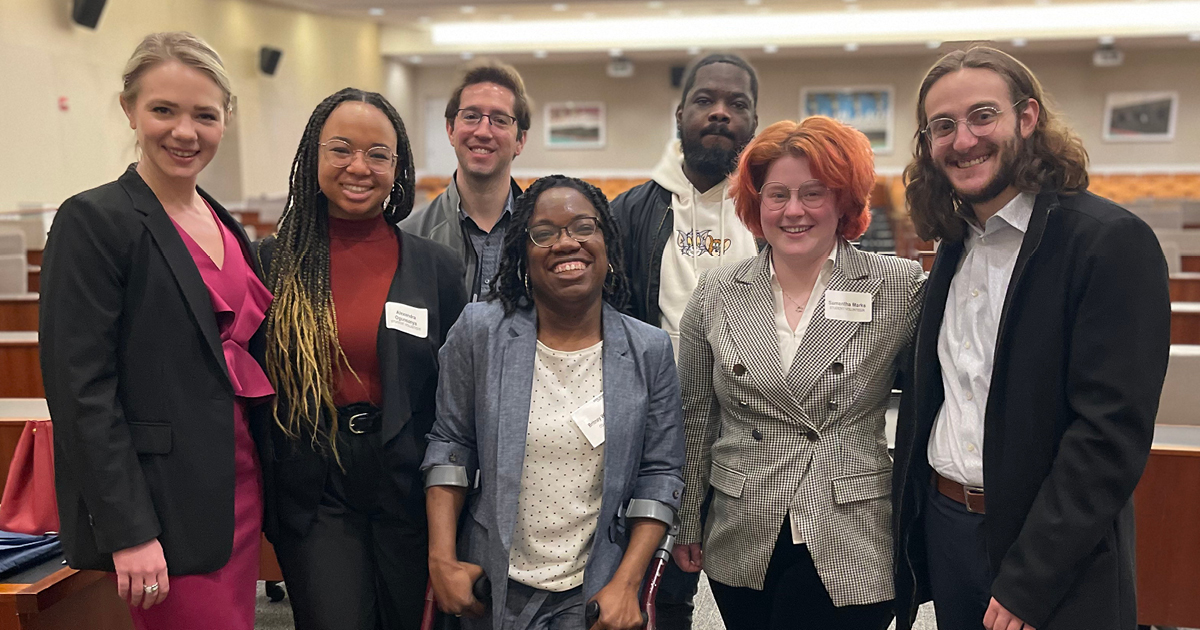Professor Britney Wilson Answers the NYLS 10
Britney Wilson, Associate Professor of Law and Director, Civil Rights and Disability Justice Clinic, joined NYLS in May of 2021. She has a varied and wide-ranging set of skills and interests: In addition to her work advocating for the civil rights of New Yorkers and beyond through NYLS’s Civil Rights and Disability Justice Clinic, Professor Wilson has written extensively about disability and its intersection with race, alongside essays, short stories, and poetry.
Here, Professor Wilson answers the NYLS 10—10 questions about her work, her interests, her worries, and the things she looks forward to.
1. What is the focus of your work?
Broadly, I'm interested in the relationship between race and disability—and not the mere existence of people of color with disabilities or the existence of disparities that disproportionately affect them from a statistical or representational standpoint. That’s all obvious. That’s just scratching the surface. I’m interested in how race functions as a social construct, historically and in the present, how disability does the same, and how they function separately and together. I’m always trying to emphasize that disability is an issue that cuts across all aspects of life—specifically social justice. The law does too. So, my current research interests are interdisciplinary: social justice, civil rights, race, history, legal history, sociology, etc.
2. How has your scholarship and interests changed over your career?
I always say that the law wasn't a career choice for me. It was something I felt I had to do as a Black, disabled woman to figure out how to advocate for myself and on behalf of others.
I've always been interested in social justice systems, because even before I had the knowledge and language to explain it, I had a feeling that the things I was experiencing were much bigger than just individual people and attitudes. So, I wanted to be a civil rights lawyer—not a disability rights lawyer. I assumed that social justice and civil rights would include disability as well. I always approached it first from a racial justice perspective. Everyone may not agree with this, but I just think in the United States of America, when you're a person of color, your frame of reference starts there. I'm Black, then disabled.
This doesn't mean that one is less important than the other, but it means that the way I analyze things is always first through race. And that’s how I approached my career at first, too. I didn't know that the two were separate—I assumed that one would come with the other. And as I realized that that wasn't the case, it became necessary for me to articulate my interests more clearly. So, if you would’ve asked me when I graduated from law school what area of civil rights I was most interested in, I would have named the criminal legal system—especially prisons. I did a lot of work related to that, because unfortunately, that’s where many people of color, people with disabilities, and people of color with disabilities were.
Then, I spent my first year out of law school doing litigation at the national office of the ACLU in the Racial Justice Program. That opened up worlds for me, because we did such a range of racial justice work. I wrote a brief in Fisher v. University of Texas at Austin, which was an affirmative action case. We did fair housing and lending discrimination, which I knew nothing about. We did Native American law. And I realized there was a much broader range of issues that interested me that had important implications for racial and disability justice. And I started thinking about social justice more broadly than just the criminal system.
3. How do people respond to your work?
I’d like to think people are excited about my work—I think and hope they recognize that I’m trying to bring certain worlds together. I also hope they recognize that I’d like to do something different than what they might be used to. I like to push the envelope, because that’s the only way you create change.
I often get the question: “Do you do civil rights or do you do disability rights?” It’s both/and, and that’s the entire point! I don’t even think most people realize that not every case we do in the clinic involves disability or people with disabilities. I think—or, at least, I hope—it helps students understand how disability (and the structure of ableism) relates to everything if we have at least some frame of reference that doesn’t explicitly involve disability, but we can still make the connections.
4. What’s a problem you wish you could solve with a snap of your fingers?
My God. All the structural issues! In our society, we have all these false structures and hierarchies—they’re the basis for all other problems.
5. What questions do you have that you want to be able to answer with your work?
Why do these silos in social justice work and issues exist? What problems are created and what gaps exist because of the siloed approach? What is the impact on the most multiply marginalized communities? And what do we do about that?

In 2022, students in the Civil Rights and Disability Justice Clinic attended oral argument at the U.S. Court of Appeals for the Second Circuit in the clinic's challenge to the New York State Department of Health's Ventilator Allocation Guidelines on behalf of chronic ventilator users.

Professor Britney Wilson at lunch with fellow disability scholars and professors Jamelia Morgan, Professor of Law and Director of the Center for Racial and Disability Justice at Northwestern Pritzker School of Law, Doron Dorfman, Associate Professor at Seton Hall Law School, and Mark Weber, Vincent de Paul Professor of Law at DePaul College of Law.
6. How do you approach teaching law?
For me, the most important skill for the students to grasp is critical thinking.
We, as attorneys, don’t have these rules memorized. What’s most important is that you are able sit in front of a client or a community member and when they describe a factual situation to you, you have the analytical ability to say, “Hmm, this is the general body of rules that might apply in that situation. Now, how do I go and find those rules so that I can determine which one best applies?” It’s a process of thinking, knowing how to get information, and knowing how to determine what information is relevant.
We also spend a lot of time in the clinic focusing on purpose. If you were to ask a clinic student the most important thing they learned, I hope they say “the importance of purpose.”
Skills-wise, for example, in your research and writing, if you don't understand what you're trying to do, how can you do it effectively? Or even, understanding your purpose as a person in a philosophical sense—your purpose as an advocate. What interests you? Why? What should you be pursuing based on that?
7. What are you excited about these days?
I’m excited for basketball season to return. I’m a native New Yorker, so I ride and die with my New York Knicks. I’m excited about an article about death investigation that I’m working on. Honestly, it’s a lot of work, but I think that we are onto something important. I’m excited about writing projects and creative projects, too.
8. What’s the next year like for you?
It’s always so hard to predict, because I do litigation and I’m at the mercy of what courts decide. We have our ongoing advocacy in the Clinic—we’re always busy. We have a lot coming up for our civil rights complaint challenging a fracked gas pipeline that runs through Brooklyn, including filing a Title VI complaint with the EPA.
We have a case that we just filed at the end of last semester challenging the City’s Access-A-Ride program. And then we have another case that we’ve been developing for a while that we’re hoping to file finally.
I was also recently selected as a Health Law Scholar by the American Society of Law, Medicine, and Ethics and St. Louis University’s Center for Health Law Studies. So, I’ll go to St. Louis at the end of September to present my draft article, and a group of health law experts— not necessarily just law professors, but medical professors, public health experts, et cetera—will workshop my article with me and give me feedback.
I’m always writing. That’s a huge part of why I wanted to move into academia: I’m a writer. For me, that doesn’t just mean scholarly projects. I write everything: I have a background in poetry and spoken word, and I’ve published short stories and creative nonfiction. I’ve been published in every genre. And so I really want to spend more time doing all of that.
9. Whose work excites you these days?
I’ll start with Nana Kwame Adjei-Brenyah. He’s one of my favorite current authors. He has an incredible way of using fiction to both illustrate the harm and absurdity of social justice issues and allow for the imagining of new and different worlds in a way that I think is basically the dream for many artists.
I have so many literary and artistic influences—past and present, and they would be impossible to name. But when I think of who I want to be as an artist, I also think about Imani Perry. She’s a trained lawyer. She’s a professor. She’s a Black disabled woman. The way she’s navigated literature, the law, and social justice is amazing to me. She’s a role model.
10. What are you reading, watching, or listening to?
I used to sing in the gospel choir growing up, so I love gospel. And R&B. I’m reading Nana’s newest book Chain-Gang All-Stars. I’m also listening to aja monet’s album, when the poems do what they do. Aja and I were both part of an organization called Urban Word NYC growing up, and I constantly keep a ton of artists who came through there in my rotation. I love documentaries, too, and I recently watched one on voting rights, Lowndes County and the Road to Black Power. I’ve got pretty eclectic tastes.
I’m also someone who really likes pop culture. I especially like studying the impact of how pop culture and social justice and society feed one another. So, I’ll watch an old sitcom from the 70s or 80s, like Sanford and Son, Good Times, The Jeffersons, or Maude to see if it holds up or see what issues they were talking about then. Lately, I’ve also been watching a lot of 90s reruns. I most recently revisited Hanging with Mr. Cooper. I remember watching the show growing up, but I don’t remember being a huge fan of it like I was of some other shows. Upon rewatch though, I thought, “This is a decent show, and we don’t give it enough credit!”

Professor Britney Wilson poses with NYLS students at the 2023 Reclaiming Disability Justice Symposium.
